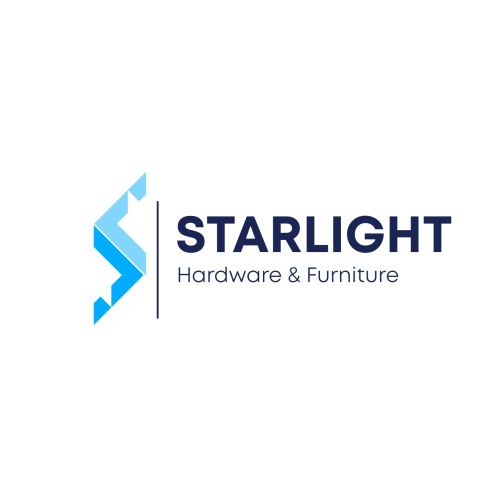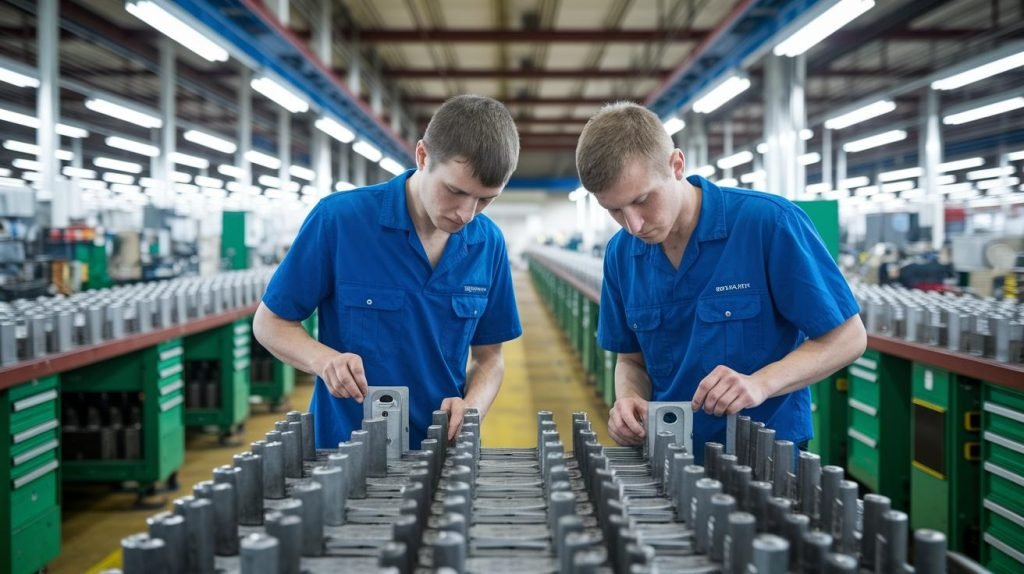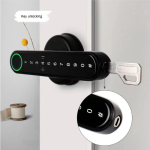Ever thought every Chinese door lock factory is the same? I did too. But here’s the secret: Some only squeak by basic safety tests, while others nail CE (European safety mark), FCC (US electronics approval) and ISO (global standards) every year.
If you want a lock with a reassuring click and smart features you can count on, pick a partner that tests every unit and keeps lead times short. Solid. Fast. Reliable.
Here are five factories that hit top standards, welcome custom designs, and crank out up to 500,000 lock sets a year. Ready to upgrade your security?
5 home door lock factory China Quality-Driven Partners

Need to find a home door lock factory in China? This guide helps you do it fast and confidently.
We’ll walk you through six key points every buyer needs:
- how many units they can make each year (production capacity)
- their compliance and certifications (proof they meet safety standards)
- the customization options (making locks fit your design)
- minimum order quantities (smallest order you can place)
- production lead times (how long it takes to make your locks)
- logistics and shipping terms (how the locks get to you)
Here are three top factories to consider:
| Factory | Capacity |
|---|---|
| Be-Tech | 300,000 smart lock sets per year |
| YGS | 50,000 units per month |
| KEYU | 500,000 units per year |
Ready for more? Jump to sections 2–6 for full profiles, OEM services, pricing, minimum order quantities, quality checks, and export logistics.
Detailed Manufacturer Profiles of Home Door Lock Plants in China
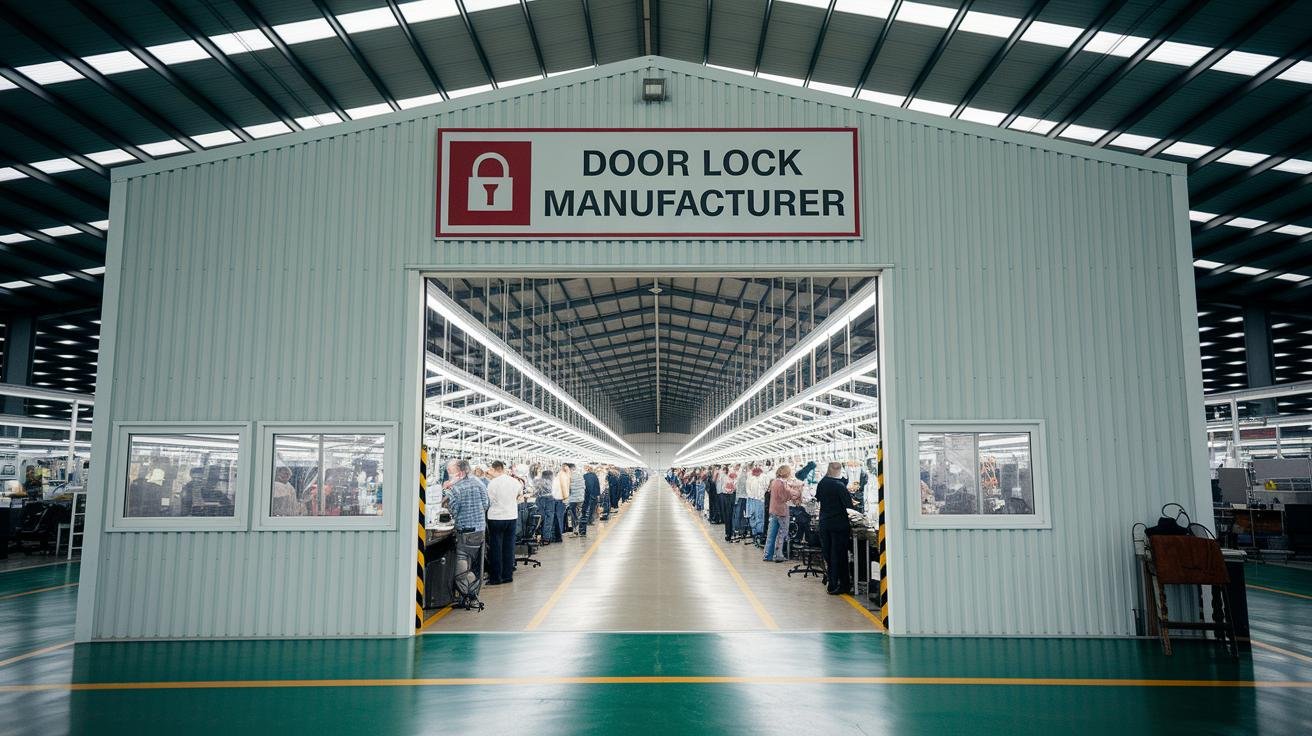
So, let’s dive into six top Chinese lock makers! Each combines rock-solid mechanics with smart tech you can trust.
Solid.
Be-Tech has been around since 1992 in Foshan. Their 35,000-square-meter workshop feels like a small town. They turn out over 300,000 smart lock sets every year. They hold ISO 9001, CE, FCC and China PSB marks and own 75 patents in biometric fingerprint sensor (a reader that checks your unique fingertip pattern) and RFID (Radio-Frequency Identification).
YGS covers 40,000 square meters. Their six automated lines pump out up to 600,000 locks a year. They’ve bagged more than 100 national patents in RFID (Radio-Frequency ID), MIFARE (a contactless smart card tech) and BLE (Bluetooth Low Energy). And they’re ISO 9001, CE, RoHS and China PSB certified, um.
iLockey’s Shenzhen plant is 5,000 square meters. It runs five SMT (Surface-Mount Technology) and CNC (Computer Numerical Control) lines. They crank out 200,000 lock sets each year. The in-house EMC (Electromagnetic Compatibility) and aging-test lab gives a reassuring click to every lock.
KEYU, also known as HUNE, sits on 36,000 square meters. Seven production lines roll out over 500,000 units a year. CE, FCC, RoHS and PSB certificates hang on their wall. Their custom ASIC (Application-Specific Integrated Circuit) chips power video intercom locks, fingerprint cylinders and smart deadbolts.
Tenon Lock’s plant covers 25,000 square meters. Four automated lines churn out 720,000 mortise and lever-handle locks annually. Each lock is IP66 weatherproof tested and carries CE, FCC and ETL marks. They also push quarterly updates to their 3D facial-recognition module (a camera-based face ID).
Sinovo Technologies uses vertical SMT and CNC workflows under one roof. They pump out 200,000 door locks every month. That’s about 2.4 million a year. Their CE, FCC, RoHS and TÜV Rheinland certifications prove quality. And their defect rates stay under 0.15 percent.
Match these specs with your project priorities to land the perfect supplier.
| Company | Campus Size (m²) | Annual Capacity | Key Certifications | Product Focus |
|---|---|---|---|---|
| Be-Tech | 35,000 | 300,000+ | ISO 9001, CE, FCC, China PSB | Biometric, RFID, Keypad |
| YGS | 40,000 | 600,000 | ISO 9001, CE, RoHS, China PSB | RFID, MIFARE, BLE |
| iLockey | 5,000 | 200,000 | ISO 9001:2015 | Fingerprint, Bluetooth |
| KEYU (HUNE) | 36,000 | 500,000+ | CE, FCC, RoHS, PSB | Intercom, Deadbolt, Cylinder |
| Tenon Lock | 25,000 | 720,000 | CE, FCC, ETL, IP66 | Mortise, Lever-handle, 3D Face |
| Sinovo | – | 2.4 million | CE, FCC, RoHS, TÜV Rheinland | Deadbolt, Hotel RFID |
OEM and Customization Services at China’s Home Door Lock Factories

If you think top OEM partners just slap logos on lock cases, think again. They guide you from your first prototype mold, holding that cool, smooth metal faceplate in your hand, to the final firmware tweak that makes the lock give a reassuring click. Every custom solution goes through strict quality control checks to meet buyer demands.
YGS leads clients through full hardware, firmware (software running your lock), and software customization. As an ISO 9001 certified factory (meeting global quality standards), they let you pick housing styles, tweak software features, or order private-label runs. Each module faces vibration testing, salt-spray testing (spraying salty mist to check rust resistance), and life-cycle tests before assembly. That’s how defect rates stay low.
iLockey turns your designs into real locks with a 30-day mechanical prototyping cycle (making a working hardware sample). Then they customize firmware and your app on demand. And they plug into your cloud via API (application programming interface, a way for software to talk). Check them out as a smart lock factory for OEM/ODM projects.
KEYU handles turnkey mold development (ready-to-use mold creation) and even makes in-house ASIC chips (tiny custom circuits), so hardware and software fit together like puzzle pieces. Pricing scales well for medium runs, making them a top choice if you need custom finishes or unique lock functions. Solid.
Tenon Lock adds fast smart features with an Android/iOS SDK (software development kit) and Tuya/Z-Wave integration. Sinovo loads BLE 5.0 (Bluetooth Low Energy), Zigbee 3.0, LoRaWAN, and 4G-LTE stacks right onto vertical SMT (surface-mount tech) and CNC (computer-controlled machining) lines. Both factories handle private-label OEM runs and deliver custom lock solutions project managers trust.
Pricing, Minimum Order Quantities and Lead Times at Home Door Lock Factories in China

At our door lock plants in China, you can start a sample run with just 100 sets. Bulk buys usually begin at 500 units and ramp up to 1,000 per SKU. And yes, the more locks you order, the lower your price per lock. Solid.
FOB (Free On Board) quotes from Shenzhen list mechanical deadbolts (a lock with a thick steel bolt) at US $8–12 each. Smart deadbolts (locks with built-in electronics and a soft LED glow) are around $25–40 per unit. When you slide your palm across the smooth metal faceplate, you get why our CE-certified locks feel so reliable.
CIF (Cost, Insurance, Freight) via Guangzhou port tacks on freight, insurance, and handling, so add about $2–5 per lock. It’s like paying a bit extra to wrap your shipment in bubble wrap, worth it for some peace of mind.
Average lead time runs 30–60 days from order confirmation to shipment. Need it fast? Our expedited line can trim that to about 20 days, though there’s a surcharge. With two decades of expertise, we’ve tested these production lines under tight schedules, from desert heat to snowy peaks.
So what’s the difference between FOB and CIF? FOB means we load your containers on deck at Shenzhen, you take it from there. CIF shifts freight and insurance onto us until your cargo arrives at your port. Pick the option that fits your logistics strength. Hmm, that reminds me, don’t forget to factor these choices into your procurement plan.
Quality Assurance, Certifications and Testing Protocols at China Door Lock Manufacturers
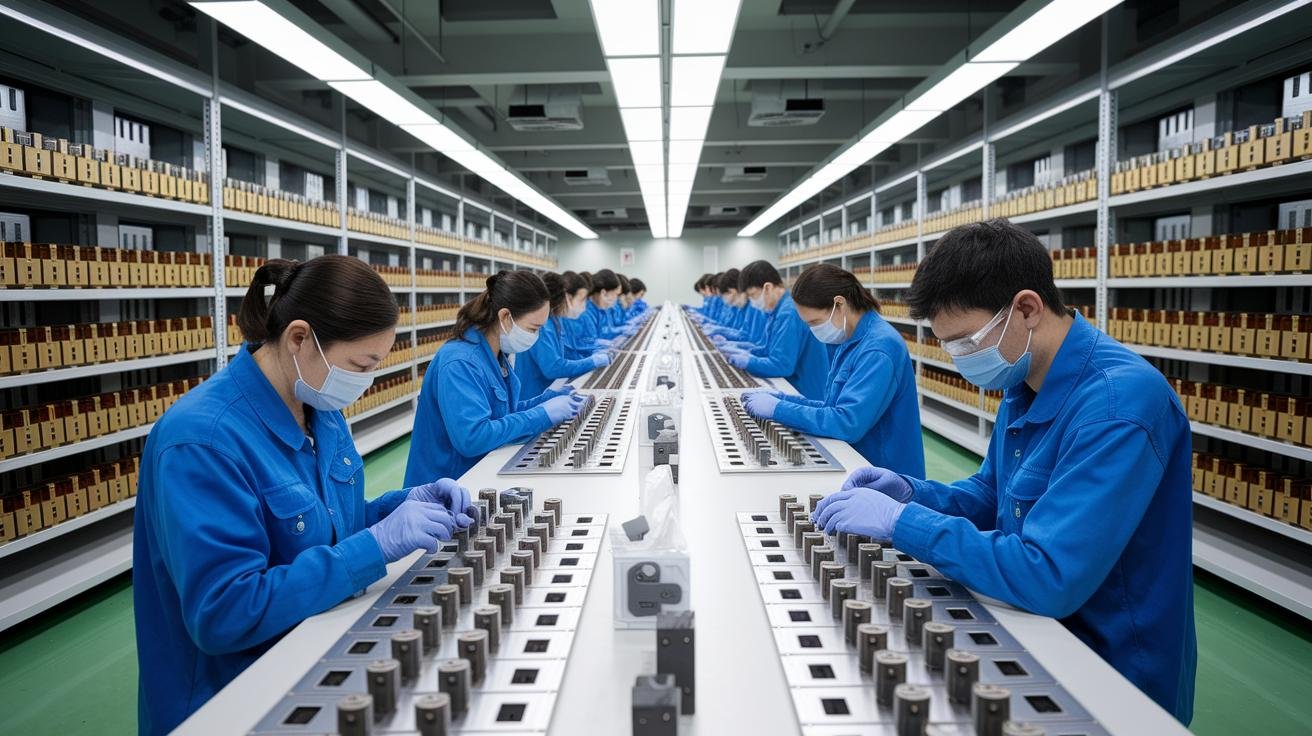
At our top-tier workshops, we inspect every smart deadbolt and mechanical keypad lock (a lock with buttons you press to enter a code) before it ever gets boxed. First, each unit soaks in a salt-spray bath for 96 to 500 hours, imagine years of sea mist eating away at the smooth metal faceplate.
Then we cycle locks through hot, humid chambers and icy blasts to mimic real-world extremes. We follow up with 100,000 to 250,000 button presses and vibration tests, each click giving you a reassuring sound, just like a watchmaker tuning gears.
For sealing checks, we push locks through IP54–IP68 tests (industry codes for dust and water resistance). You’ll see locks withstand dust storms, brief dunks, and heavy splashes with a soft LED glow still guiding your way.
These steps keep defect rates under 0.15 percent. In our in-house labs, we run EMC (electromagnetic compatibility) tests, accelerated aging trials, and environmental stress checks. It’s kind of like giving each lock a full gym workout before it hits the market.
We’re proud of our certifications. Our factories meet ISO 9001 standards and carry CE marks that European buyers rely on. You’ll also find UL listings on the production line, plus FCC, RoHS, China PSB, ETL, and TÜV Rheinland logos. Some partners even invite SGS (a third-party auditor) for extra peace of mind.
Over time, every biometric fingerprint sensor (a reader that checks your unique fingertip pattern) feels precise under your touch. Each keypad press snaps solidly. We’ve tested these locks in sandy deserts and snowy peaks, so they’ll stand up to daily demands.
Logistics, Export Requirements and After-Sales Services from China Door Lock Suppliers
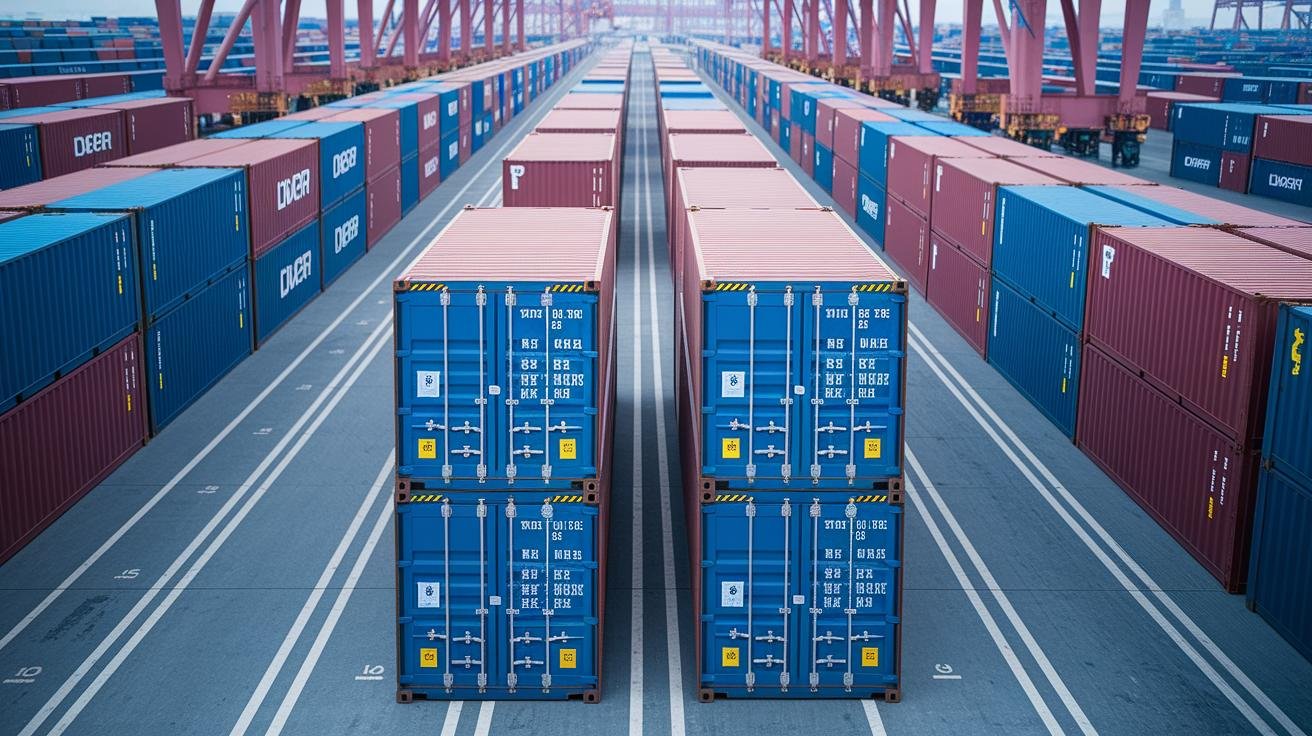
Exporting locks from China means handling a few key documents. You’ll get a commercial invoice (the bill listing your purchase), a packing list (what’s inside each crate), a bill of lading (your shipping contract), and a CCC (China Compulsory Certification, a safety stamp). It sounds like a lot, but it just means your locks slide smoothly through customs. Your locks sit snug in their wooden boxes, ready for the next step.
We load your locks into 20- or 40-foot metal containers, like packing your kitchen into a giant suitcase. You can pick FOB Shenzhen (you take charge once the container’s on the ship) or CIF Guangzhou (we even include insurance and freight). Transit usually takes 20 to 30 days. That gives you time to clear shelf space or prep your stocking areas.
Want a secret perk? Many factories offer a pre-shipment check by SGS or another inspector. They’ll film the whole process, locks lining up, parts clicking into place, and send you a video plus a photo report. That way, you know exactly what’s on the boat before it sails. No surprises.
Most suppliers back your locks with a 12- to 24-month warranty. After they land, you can call or email for remote troubleshooting. Need a new part or a hands-on fix? Some companies even send an engineer to your site. They cover firmware updates (software tweaks in your lock’s brain), hardware swaps, and user training so your team can tap a code or scan a fingerprint sensor (the reader that checks your unique fingertip pattern) like pros.
For a truly hands-off solution, ask about DDP delivery (Delivered Duty Paid). They’ll clear customs, wheel your locks right to your door. Want to sell directly to your customers? Drop-shipping’s an option too, you never have to touch a single lock.
Total peace of mind.
Global Distribution and Case Studies of Chinese Home Door Lock Projects
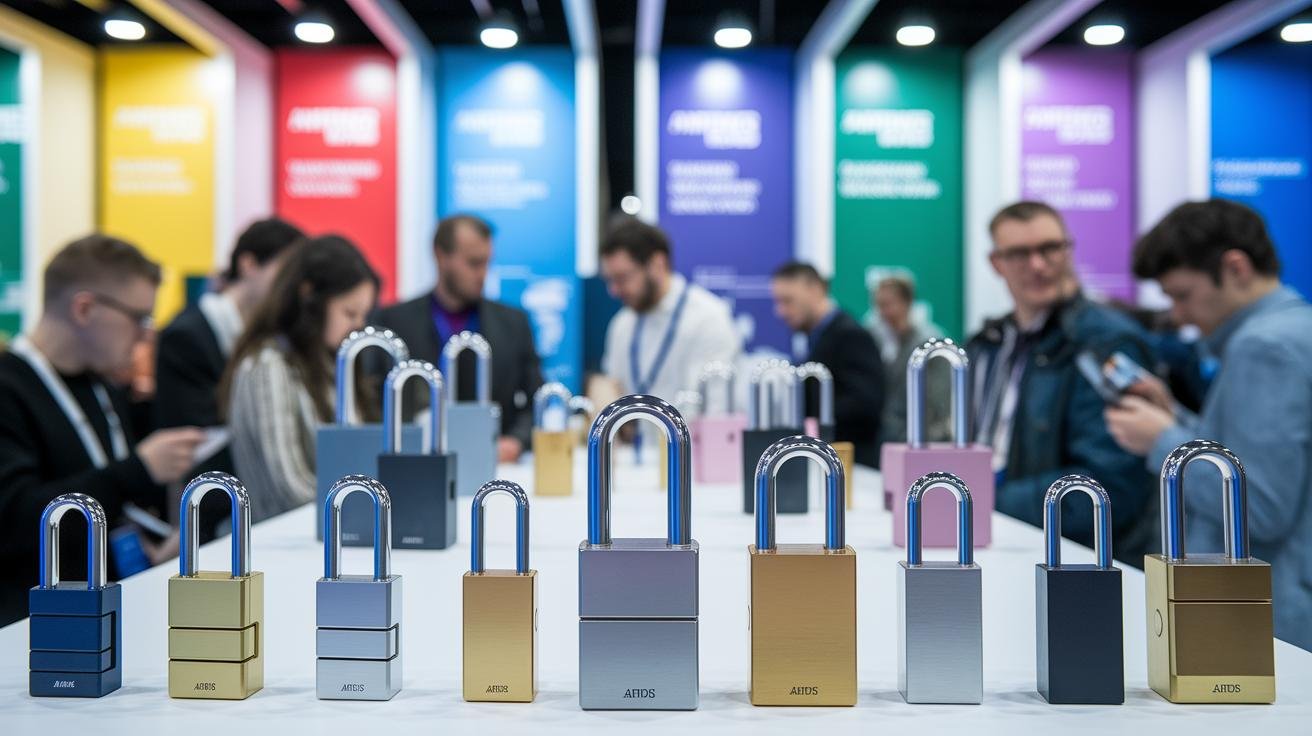
Chinese manufacturers have tapped into global distribution networks. They’re shipping locks to Europe, North America, Australia, the Middle East, and Africa. And they’re gaining ground fast.
Be-Tech’s cloud-based locks secure community housing estates in Spain and Italy. Property managers get real-time door status and over-the-air (OTA) firmware updates (wireless software updates for your lock). It’s like having a live feed on every door.
Sinovo Technologies shipped 3.7 million printed circuit board (PCB) assemblies (the electronics board inside each lock) and 8.56 million biometric fingerprint sensor modules (a reader that checks your unique fingertip pattern). They went to U.S. and Gulf hotel chains in 2024. These parts power RFID (radio-frequency identification) keycards and smart deadbolts. Solid.
YonAnn’s Tuya-based systems are piloting in Australian eco-village developments. They link door access to mobile apps and home automation scenes. Think of it like using your phone as a key and triggering your lights to greet you. Back to our locks…
Every spring, leading suppliers pack their latest models into the Canton Fair. Architects and specifiers stroll booths listed in the Guangdong lock maker directory. They test the smooth metal faceplate and admire the soft LED glow.
Online, these manufacturers list on Alibaba’s lock manufacturer listings and the Made-in-China portal. They team up with integrators, wholesalers, and retail chains worldwide. That’s how those smart locks end up from New York condos to Nairobi townhouses.
Final Words
In the action, we ran through six sourcing essentials, production capacity, compliance and certifications, customization, minimum orders, lead times, and logistics, and spotlighted three top factories with their key output metrics like volume and patent counts.
You’ve also got the scoop on OEM services, customization timelines, pricing tiers, rigorous testing protocols, and export requirements to minimize surprises.
Now you’re ready to choose your ideal home door lock factory China partner. Here’s to hassle-free sourcing, strong relationships and secure projects ahead!
Feel confident knowing every step is covered.
FAQ
What is the price range for home door locks from Chinese factories?
The price range for home door locks from Chinese factories typically runs US $8–12 per mechanical deadbolt and $25–40 per smart lock set, FOB Shenzhen. Bulk discounts apply for orders above 500 units.
Which Chinese factory makes the best home door locks?
The top-rated factory depends on your needs. Be-Tech excels with 300 000 smart lock sets per year, YGS offers 50 000 units each month, and KEYU supplies 500 000 mechanical and smart locks annually.
Who are leading door lock manufacturers in China?
Leading door lock makers include Be-Tech, YGS, KEYU, Sinovo and iLockey. They are recognized for robust production capacity, extensive patent portfolios and global certifications like CE, FCC and RoHS.
Who are major smart lock makers in China?
Major smart lock makers in China include Be-Tech, YGS, Sinovo and iLockey. They support features such as biometric fingerprint sensors (a reader that checks your unique fingertip pattern) and Bluetooth connectivity.
Which companies make door handle locks in China?
Door handle lock specialists in China include Tenon Lock, KDM Steel and YonAnn. They offer mechanical lever handles, smart-handle integrations and IP-rated finishes for residential and commercial applications.
Where are Schlage door locks manufactured?
Schlage door locks are manufactured in Mexico at a facility that follows strict UL and ANSI standards. They combine a smooth metal faceplate with robust internal mechanisms for reliable home security.
Who is the biggest lock manufacturer?
The biggest lock manufacturer globally is Assa Abloy. It owns multiple brands and produces millions of locks yearly, ensuring consistent quality and a reassuring click in residential, commercial and industrial markets.
